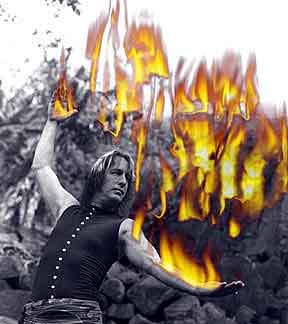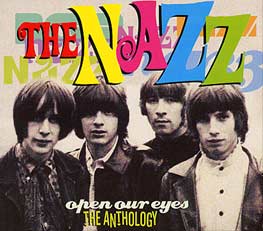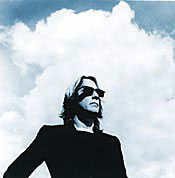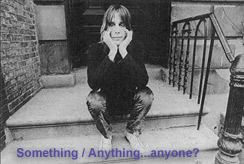Todd Rundgren
interview written by Robert Silverstein
Anybody still remember 1968? One of the memorable pop events from the year that saw return to the roots albums by The Beatles (The White Album), The Beach Boys (Wild Honey) and The Rolling Stones (Beggar’s Banquet) remains the ‘68 album debut from Philadelphia’s power pop sensation, The Nazz. Simply called Nazz, the album turned the pop scene onto the rapidly developing talents of the quartet’s songwriter and guitarist Todd Rundgren. Both musically and fashion wise, The Nazz took their cues from hip ‘60s Britpop trendsetters like The Who and The Yardbirds and in that respect Rundgren & company were light years ahead of most American bands from that period. Ending on a down note, the band managed nevertheless to release two excellent power pop albums and a collection of what he now calls ‘odd-ments’ entitled Nazz III. If there was an up side to the breakup of The Nazz it was the arrival of Rundgren as a solo artist, recording studio wizard and trendsetting pop pundit. The 1972 double album masterpiece Something/Anything, 1973’s A Wizard, A True Star, and his ‘75 Faithful album still shine as favorites from the early years, and when one considers the sheer number of albums released, it’s apparent that post-Nazz, between 1970 and 2000, Todd has released a prodigious array of solo works—this in addition to the numerous albums recorded with his fusion rock band Utopia. In late 2002, thirty three years after the ‘69 Nazz Nazz album came out on Screen Gems Records (through Atlantic Records), Rundgren remains a perennial topic of interest in the music world. A new reissue agreement with Sanctuary Records has brought forth a superbly packaged double CD Nazz set in addition to an ongoing series of various live Rundgren archive CDs and DVDs entitled The Todd Rundgren Bootleg Series. The first two CD titles in Sanctuary’s Bootleg Series include the double CD Live At The Forum - London ‘94 and the first CD release in the Utopia Bootleg Series - KSAN 95FM Live ‘79. Uniformly packaged with good liner notes and rare photos, both "boots" sound fine and offer a rare, detailed glimpse into Rundgren’s legendary prowess as a performing musician. Speaking to us live from Hawaii on December 11, 2002, Todd was in a pretty humorous mode as he spoke of the Nazz period, the Bootleg Series, his underrated and overlooked 2000 studio album One Long Year, his fondness of the internet, his guitars and his lifelong appreciation of The Beatles.Robert Silverstein: RS
Todd Rundgren: TR
RS: Todd, it’s Robert Silverstein from 20th Century Guitar magazine and mwe3.com.
TR: How you doing?
RS: How are you today?
TR: Not so bad.
RS: Amazing to be able speak with you. You’re in Hawaii now?
TR: Yes...the modern marvels of science! (laughter)
RS: Which island do you live on?
TR: On Kauai, that’s the western most
RS: Don’t you miss the snow?
TR: So far, that I haven’t missed. I get to the mainland enough, I’ll see plenty of snow.
RS: Isn’t there snow on Maui this time of year?
TR: The big Island (Hawaii). The big Island has some tall volcanoes on it and on the top of one of them it does snow.
RS: We had a blizzard here on Long Island last week and today we’re getting freezing rain so we’re under the ice so to speak!
TR: Lovely! And it isn’t even winter yet.
RS: I really miss Hawaii. How long have you lived there?
TR: Six and a half years now.
RS: I remember Haleakala and driving up the Hana Road. I speak sometimes with the great Hawaiian guitarist Kapono Beamer, who’s in Oahu. Did you ever hear his stuff? He’s one of the greatest Hawaiian guitarists/composers I’ve heard.
TR: Yeah, I know of him. I haven’t met him personally but I know of the Beamers.
RS: It’s great to see The Nazz albums reissued in 2002 as a double CD retrospective called Open Our Eyes - The Anthology. How did the deal with Sanctuary Records to release your archival music happen?
TR: The Nazz technically isn’t archival. If we knew that the masters had existed they probably would have belonged to Rhino. In point of fact, The Nazz...there are a few demos and stuff that existed, but The Nazz didn’t do a whole lotta stuff in the studio that wasn’t eventually released already by Rhino. But I think that because of the deal that we made with Sanctuary over the archive they evaluated and felt there was enough there to do a whole series of releases. For completionists, they’ve gathered together all of that Nazz stuff—I can’t imagine that there’s anything else existing in the world that they haven’t collected. (laughter) The rest of the archive—that could be said to be almost a bottomless pit (laughter). I don’t even know what’s in it and Sanctuary probably has as good an assessment of what’s there as anybody does but they haven’t given me a whole collated list. They just say, ‘okay, here’s a show from 1980, will you approve this and let us release it?’. And the other difference, I think is that Sanctuary is concentrating on the DVD releases. There’ll be alot of video as well as some of the more standout live shows in the last several years.
RS: So, have you been involved with these releases, overseeing them?
TR: Well I don’t fully oversee them. They decide first of all, which shows they want to put out. I just tell them whether I think the show is of adequate quality—sound and performance wise. Sometimes there’ll be, oh a few numbers in a show that just aren’t going to pass muster! (laughter) And sometimes the people who put these together, they’re what we call completionists—they don’t care how badly the song is performed. They just want to have a copy of it. (laughter) But my standards haven’t changed simply because the show is a part of history. I think we still don’t want to put out anything that’s blatantly awful just because it presents something you haven’t heard before. (laughter)
RS: So Sanctuary will be doing DVDs too? Have they come out yet?
TR: No they haven’t but the first two DVDs are in the works as I understand it. And I haven’t seen the video part, I’ve only been given the audio part to approve. I probably have seen the video at one point (laughter) but they don’t give me the full DVD, they just send the audio for approval.
RS: I was one of your first teenybopper fans out here on Long Island who bought the first Nazz album when it came out I guess in ‘68 and then in ‘69 I bought the red vinyl Nazz Nazz Lp.
TR: Oh great.
RS: Whose idea was it to release the Nazz Nazz Lp on red vinyl? No one had done that before!TR: Well when I was growing up, I used to listen to these 45 rpm records that were recordings of The Boston Pops Orchestra doing sort of light classical music like “Chicken Reel” and “The Skater’s Waltz”. And I had a whole collection of those that I used to listen to when I was 2 and 3 years old on a little 45 rpm record player. And I would listen to the music and I would gaze through the colored vinyl records. And when I finally had an opportunity—well I wasn’t in a position to demand, but I beseeched that we get a record put out on colored vinyl. And I guess the whining worked, at least for one record, and then years later when I put out Something/Anything I pulled the same trick. One record was blue vinyl and one record was red.
RS: My copy had two black vinyl records at the time.
TR: I think it was only the first 5000 records. The excuse the record company usually uses is that virgin vinyl—which is necessary for these colored releases—was in short supply. As the ‘70s went on, that was another casualty of the oil embargo that we had in the late ‘70s. That’s when the quality of vinyl records started to go down because they began using more recycled vinyl and the problem with recycled vinyl records is that sometimes they can’t get all the paper off where the label was. Melt the vinyl down and then it’ll have little bits of paper in it which’ll cause the record to skip.
RS: I remember the first two Nazz albums, and especially Nazz Nazz were very high quality vinyl pressings.
TR: Well, I hope so because it’s...virgin vinyl! (laughter) Never been used before.
RS: You mention The Who and The Move as being a couple big early influences on The Nazz. Could you mention some of your other early musical influences?
TR: Well The Yardbirds were a big influence. We were always into the rave-up kind of thing. Let me see now...The Beatles of course, but The Beach Boys were an unusual influence in that we were into sort of the heavy guitar stuff. At the same time we were just as inclined to do these thick harmonies behind our lead vocalist. So it was unusual I guess—the combination of things. On one hand, The Who and The Yardbirds and these other sort of rave-up bands from England and then at the same time the more harmonious part of The Beatles and The Beach Boys...that kind of thing.
RS: Do you remember the first record you bought?
TR: The first record I ever bought. Well let me see. The first pop record I ever bought was, I believe was The Beatles Second Album.
RS: That was the American one right?
TR: Yeah, the American second album (laughter), not the British one. It was a clooge of two different albums at that point.
RS: That’s the one with “Roll Over Beethoven” on it.
TR: Yeah, I remember that. I used to sit down and listen to that. At the time I was fascinated by the bass drum on it.
RS: It’s interesting that the lead off song on the Nazz Open Your Eyes box set, “Loosen Up” - is a song spoof of the Archie Bell & The Drells “Tighten Up”. Where does that song fit in the Nazz repertoire?
TR: Yeah, we were some fun-loving guys for a while. We’d crack a joke. A few of our songs were tongue-in-cheek in a way (laughter) so...by the time we got into the studio for the second time yeah, we were really into goofin’ off a little bit.
RS: Was that song supposed to be on the Nazz III album?
TR: Well what was the second Nazz album was supposed to be a double album. The label was disinclined to release a double album so we had to split the record up into what turned out to be the second album and then remnants which were collected and came out in various versions as a third album. But there were not three sets of sessions. It was only two. We only went in the studio to record two albums (laughter).
RS: Was that why the order of songs was changed on the box set—to reflect the original double album concept for the second Nazz album?
TR: I think so...and I don’t even remember where our original running order might have been. At this point it’s probably moot. Most people remember the second album as it was released and the third album is kind of an unusual collection of odd-ments.
RS: It’s amazing that “Hello, It’s Me”, originally from the first Nazz album, is actually the first song you wrote.
TR: Yeah, it was. Curiously enough it was a ballad but I was kinda always moping about some girl at some point. And I don’t think the fact that it came out—or was known as the first Nazz single—was something that happened by design either. We put out “Hello, It’s Me” as the b-side of “Open My Eyes” and “Open My Eyes” didn’t take off for some reason and eventually they flipped it and “Hello, It’s Me” did. And that caused the band to sort of last a little bit longer then it would have naturally. I was going out and meeting the band to do gigs after I had quit (laughter) because “Hello, It’s Me” had become successful enough for us to make some money at it. So the band would sort of get together and go do a gig or two, make a little money, and then go our separate ways again and that didn’t last for very long either.
RS: Looking back on it, the lead off track to the Nazz Nazz Lp, “Forget All About It A While” has got to be one of the great lead-off album cuts from the ‘60s.
TR: At that point, I was into doing something of a concept album. It wasn’t supposed to be Sgt. Pepper per se, in that we weren’t all dressing up in weird costumes and adopting some sort of fictitious pseudonym (laughter), pretending to be another band. But by that point I was starting to think in terms of a greater concept in terms of albums instead of singles. The Beatles were the first band to sort of redefine the record market in terms of...one factor...it was originally 45’s. You couldn’t be successful unless you sold alot of 45’s. And then just around Sgt. Pepper I guess The Beatles proved you could be successful separately from how successful you were selling 45’s because Sgt. Pepper had no singles on it at all. And that woke alot of people up to the possibilities of doing long form records, made up of songs still, but doing long form records that didn’t depend on hit singles to be musically successful.
RS: It’s great that there’s a web site that has the complete lyrics to all The Nazz stuff. (http://RoCeMaBra.com/todd/lyrics) I finally figured out the lyrics to“Forget All About It”—If you haven't got time to rest, then take the record off now! (laughter)
TR: Ah-ha...It was sort of a demand for full attention! Kind of petulant in a way. (laughter)
Forget All About It
Everyone's got to have a cause or two
No one's changing enough to help you
There's something basically wrong
Everywhere, we revolve out of our time
And we know that's there's
nobody listening to people like us
But for now, for awhile
We just forget all about it awhile
Forget all about it awhile
For awhile
Thoughts of life, lots of women, thoughts of love
These are things that we can't be sure of
And every minute you live takes you
a minute towards when you must die
And we know there are
times when I'm not even sure I'm alive
But for now, for awhile
We just forget all about it awhile
Forget all about it awhile
For awhile
No one's fit to run the world, as far as I can see
The only person fit to run my world is me
But that's just one of my own personal crusades
And for now I'm not complaining, not campaigning
If you haven't got time to rest, then take the record off now
RS: Also the Nazz Nazz track “A Beautiful Song” was the first rock song I heard on an album to run nearly 12 minutes!
TR: (laughter) Jimmy Webb’s fault probably! Yeah, “someone left the cake out in the rain”.
RS: Any reflections on how you created “A Beautiful Song”?
TR: Well, I always had musical designs that transcended rock form, I guess. I’d always wanted to be a musician but until Beatles came along, the only way you could be a musician was to be a serious musician and learn how to play an instrument so you could get a job in an orchestra perhaps. But The Beatles proved that you could play a guitar and make a lifelong avocation of it, more or less. Or make enough money to retire on (laughter) I guess. So, from that point on of course I wanted to have a band and to be in a band but I never gave up these sort...my fascination with classical composers and composing for the big unit, you know, the orchestra. So, that was another indulgence, that having an album budget allows you to exercise. And I did it on both the Nazz records and on rare occasions on my own records as well.
RS: I was also always interested in knowing the story behind the Nazz Nazz song “Meridian Leeward”.
TR: I really don’t know, actually. Some things are so far in the murk. It may be just some words that I heard and then figured ‘Oh, I’ll write a song about this, what ever it is’...(laughter). I’m trying to replay the lyrics in my head to see if I recall anything significant, except for maybe a hostility to policemen. (laughter) It was just supposed to be a silly love song (laughter), just a goofy song.
RS: It was kind of Zappa-esque and showed another side to your early songwriting.
TR: Quite possibly if we were into demonstrating our musical deftness that we might attempt something like Frank Zappa but I don’t think we were ever that overt. You know, I was a big Frank Zappa fan but never imagined that I would be in a Frank Zappa like band. But then years later of course, we had a Mahavishnu-like band (laughter) with the first version of Utopia for instance.
RS: The Nazz double CD box set features quite in depth liner notes. It’s great that you were on hand to supply so many great memories.
TR: You mean still alive? (laughter)
RS: Did The Nazz get to play any prime time TV shows like The Tonight Show with Johnny Carson?
TR: We did no really big TV shows. I know that our video got played on American Bandstand and we might have been on there as well (laughter). American Bandstand you never did anything live, you lip-synched. We did a couple of local shows including one including one that was hosted by Terry Knight, in the Michigan area. I remember doing that. And I remember thinking it was sort of like a cheesy Hullabaloo and remembering afterwards how much we hated lip-synching and wished to avoid it. Let me see now...yeah the video archives on The Nazz are pretty slim. There’s not a lot, I don’t think.
RS: I was reading in the Nazz box notes that the first gig The Nazz played was supporting The Doors in Philadelphia in June 18, 1967.
TR: Well it was sort of the first big gig, not the only gig.
RS: Any stories from that concert? Did you get to see The Doors play that night?
TR: Yeah we did. We got to watch them from the wings. I wasn’t that impressed with them. I was interested in what Ray Manzarek was doing because that was sort of something unusual. Covering the bass with his left hand on this funny keyboard thing and playing the organ at the same time. He had a particular style, you know it was interesting. So I think for us, we were more interested in the other players in the band than we were in Jim Morrison’s histrionics which we thought were kind of amusing. I always thought he sang sort of like...not like Frank Sinatra, more like Dean Martin (laughter). He had this croon-y quality that, I don’t know, I just didn’t think fit.

The "almost" official blog for everything Todd Rundgren Related........................................................................................................................................................................... Please visit the sister facebook page https://www.facebook.com/Ma4utopia?ref=hl
Friday, July 6, 2012
Interview written by Robert Silverstein
Subscribe to:
Post Comments (Atom)




No comments:
Post a Comment